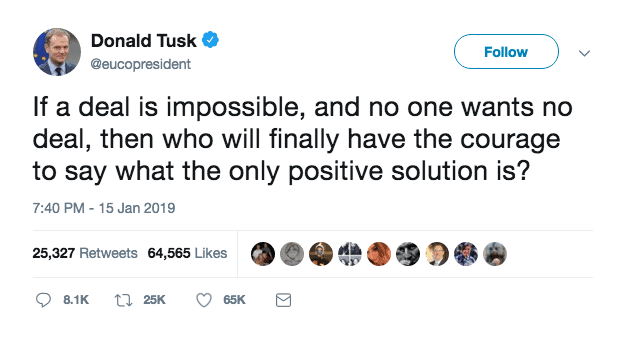
The moment when MPs revealed the scale of the government’s Brexit defeat: 432 votes to 202
The outcome was barely in doubt, but the scale of the UK government’s defeat on the Brexit withdrawal motion has sent a shockwave around the globe.
The 230-vote defeat of the government (the greatest ever in Parliamentary history) means that politically the UK has taken a leap into the unknown. For industry that means yet more uncertainty, disruption and wasted or missed investment – and the British Chamber of Commerce (NCC) has pulled no punches in its assessment of the situation.
“There are no more words to describe the frustration, impatience, and growing anger amongst business after two and a half years on a high-stakes political rollercoaster ride that shows no sign of stopping,” said BCC director-general Adam Marshall this morning.
“Every second that ticks by sees more businesses spending money on unwanted changes, activating contingency plans or battening down the hatches and halting investment, as they try to anticipate a future that is no clearer now than it was at the time of the referendum result.”
That’s pretty much the sentiment across the board from UK businesses.
Amidst all the myriad possible paths forward, two seem to be much more likely after the vote – no deal, or no Brexit – and longing for the latter may explain why the pound stayed reasonably firm and the FTSE remained largely stable this morning. European Council President Donald Tusk has already tweeted that the UK staying in the EU is the “only positive solution.”

It is widely thought that the date of the UK’s departure from the UK will have to be pushed back to give time for a new deal or second referendum, and that means suspending Article 50, which may be problematic. The process can be revoked unilaterally by the UK, but suspending or postponing it is not possible, at least officially, without a unanimous vote by the European Council.
Financial Times writer Jim Pickard tweeted yesterday evening that Chancellor Philip Hammond has told business leaders that the EU won’t consider an extension to Article 50 until the UK government has a clear plan, and that means seeking alliances with opposition MPs first.
The government says it is doing just that and will return with a Plan B to put in front of parliament next Monday – but first it has to survive a no confidence motion that will be debated today.
Industry is clearly united on the need to avoid no deal, and the need for the UK parliament to come together, with the BCC saying: “businesses will take a dim view of more shuttle diplomacy and last-minute bargaining, which have so far done nothing to end the political impasse.”
The Association of the British Pharmaceutical Industry (ABPI) chief executive Mike Thompson said that no-deal would be “extremely challenging” and raises the risk that access to medicines may be disrupted from 29 March. There are particular concerns about the transport delays at the UK/EU border and the loss of mutual recognition of product testing.
“The focus of pharmaceutical companies is on making sure that medicines and vaccines get to patients whatever the Brexit outcome,” added Thompson. “This includes stockpiling and duplicating manufacturing processes here and in Europe.”
The European Federation of Pharmaceutical Industries & Associations (EFPIA) thinks there are “very real, tangible and immediate threats to patient safety and public health in both the UK and across Europe” if the UK leaves the EU in a disorderly manner on 29 March.
EFPIA’s director general Nathalie Moll has urged policy makers in the UK and EU to “put politics aside and put measures in place to prevent patients being harmed by the consequences of Brexit.”
The organisation has come up with a list of actions that negotiators need to agree on to avoid disruption and protect patients, including the introduction of measures that will continue to recognise UK based testing until it can be transferred to the EU, and measures to enable the continued UK participation in data sharing projects aimed at public health and medicines safety.




